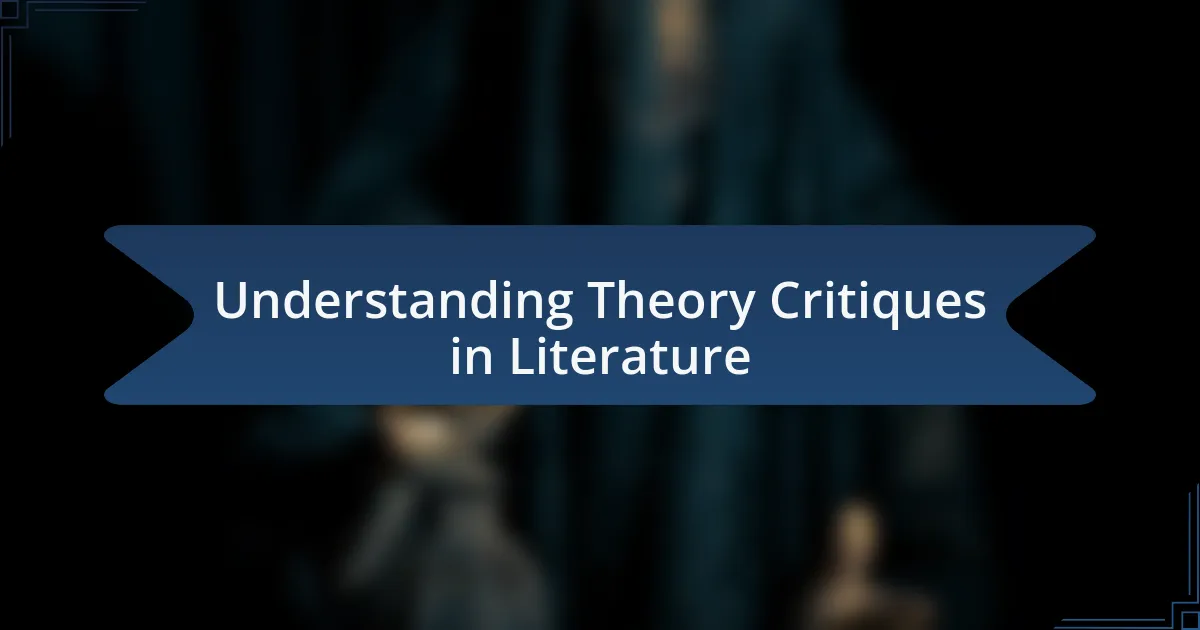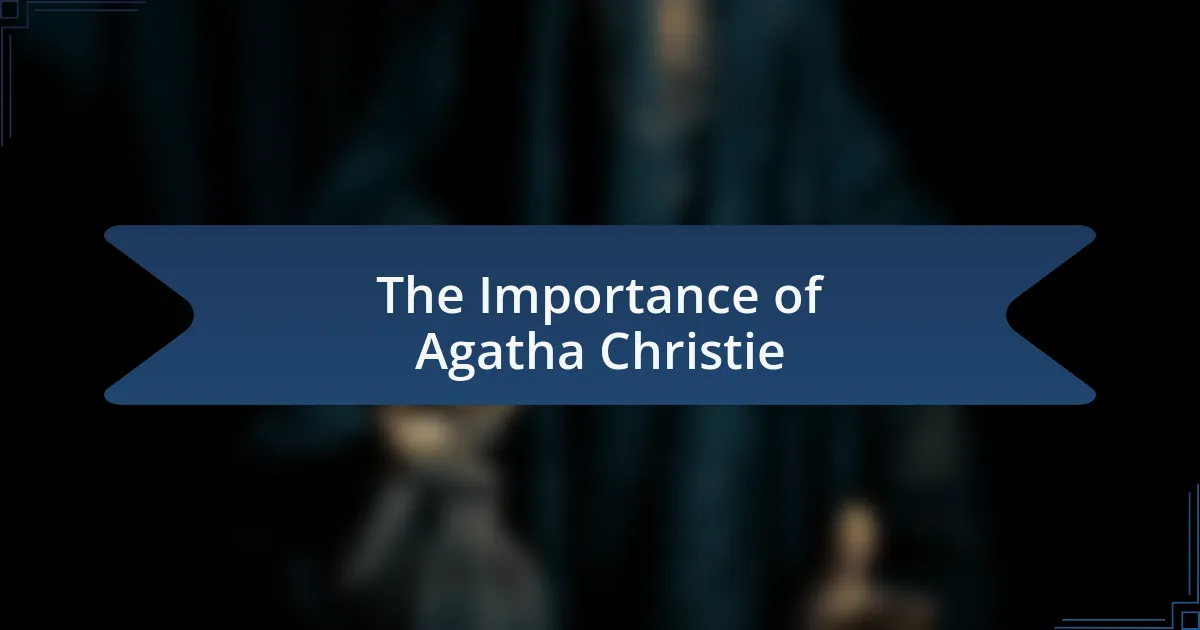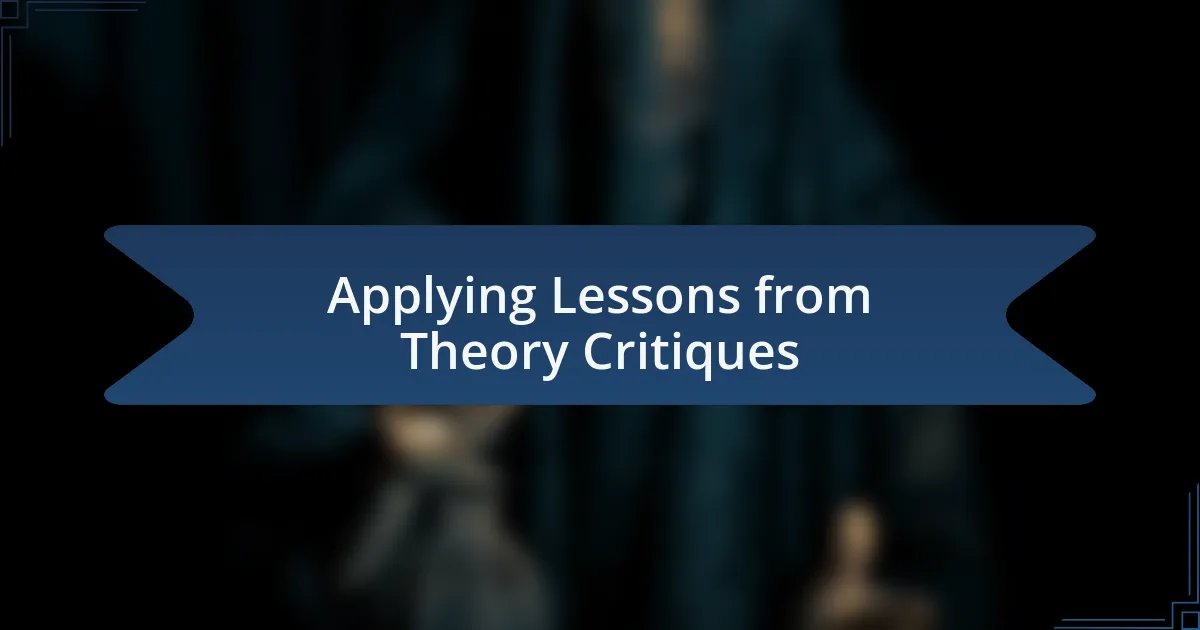Key takeaways:
- Theory critiques in literature encourage deeper engagement with texts, revealing complex themes and power dynamics, particularly in Agatha Christie’s works.
- Agatha Christie’s narratives explore human morality and the ambiguity of justice, challenging readers to reflect on their own ethical boundaries.
- Critiques of Christie’s writing highlight the portrayal of gender roles and the balance between surprise and character development, prompting discussions about societal norms.
- To honor Christie’s legacy, engaging with her works through community discussion, modern adaptations, and critical examination enhances appreciation and relevance.

Understanding Theory Critiques in Literature
Understanding theory critiques in literature can feel like navigating a maze. It’s not just about reading a text; it’s about dissecting it through various lenses, which can sometimes be intimidating. I still remember when I first encountered feminist theory—suddenly, works I thought I knew took on new meanings, and I began to see the subtle ways gender shapes narratives. Isn’t it fascinating how a single critique can unravel complexities we’d overlooked?
Engaging with theory critiques also opens up conversations around power dynamics within literature. It prompts essential questions like: Who gets to tell the story, and whose voices remain unheard? I’ve found that grappling with these questions has deepened my appreciation for authors who challenge societal norms, especially in the works of Agatha Christie, where motives and backstories often reflect broader societal issues.
Ultimately, theory critiques challenge readers to engage actively with texts, pushing us to not only understand but question what we encounter. For instance, when I revisited a Christie mystery after studying postcolonial theory, the subtle undertones of cultural representation jumped out at me, sparking a re-evaluation of my previous readings. How many layers of meaning are waiting for you to uncover in your favorite novels?

The Importance of Agatha Christie
Agatha Christie stands as a monumental figure in literature, largely because she elevated the mystery genre into an art form. My first encounter with her work, Murder on the Orient Express, was an eye-opener; the intricate plotting and character development left me astounded. How could such a seemingly simple whodunit offer such depth? It’s this brilliance that has allowed her stories to resonate with readers across generations.
What I find particularly crucial about Christie’s contributions is her ability to blend entertainment with profound themes of human nature. For instance, her portrayal of flawed characters challenges us to confront our own moral dilemmas. I remember discussing And Then There Were None in a book club, where we delved into the psyche of each character. It was revealing to see how Christie exposed the darkness within us all—making me wonder how often we judge others without examining our own faults.
Furthermore, Christie’s influence extends beyond her stories; she has set a standard for storytelling that inspires countless authors today. When I first tried writing my own mystery, I realized how daunting it is to craft an unexpected twist while keeping the reader engaged. Her legacy has taught me that great storytelling isn’t just about the plot, but about weaving in the human experience in a way that captivates and provokes thought. Isn’t that what every writer aspires to achieve?
Key Themes in Christie’s Works
One recurring theme in Christie’s works is the complexity of human morality, often depicted through her characters’ morally ambiguous choices. I recall reading The Murder of Roger Ackroyd, where I was struck by the protagonist’s internal conflicts and how they reflected the moral gray areas we all navigate. Have you ever felt torn between right and wrong? Christie captures that struggle beautifully, challenging readers to reflect on their own ethical boundaries.
Another significant theme is the illusion of appearances, which Christie masterfully unravels. In my experience, Death on the Nile showcases how seemingly idyllic lives can harbor treachery and betrayal. When I first finished the book, it made me more observant in my own life; how often do we misjudge a situation based on surface impressions? Christie encourages us to look deeper, reminding us that not everything is as it seems.
Finally, I find the theme of justice and its often ambiguous nature to be incredibly thought-provoking. In And Then There Were None, characters face retribution for their past actions, prompting a reflection on whether true justice can ever be served. This notion left a lingering question in my mind: Do we truly understand what justice means? Christie’s exploration of this theme invites us to ponder the real-world implications of justice and moral accountability, making her work feel not only timeless but also highly relevant today.
Analyzing Critiques of Christie’s Works
Critiques of Agatha Christie’s works often peel back her intricate narratives, revealing layers that many readers might overlook. For instance, I remember diving into a discussion about Murder on the Orient Express, where critics highlighted the moral dilemmas faced by the characters. I found myself questioning: can the ends justify the means? This debate opens up a fascinating examination of our perceptions of justice—an element Christie’s plots masterfully evoke.
Another point of critique that resonated with me was the portrayal of gender roles in her stories. Some scholars argue that Christie’s female characters oscillate between empowerment and traditional femininity. During a book club meeting, a heated discussion broke out over the character of Miss Marple; is she a progressive figure or simply a reflection of her time? This ambiguity highlights how Christie’s works can reflect societal norms while simultaneously subverting them, offering a mirror to our evolving understanding of gender.
Lastly, the narrative structure employed by Christie has been both praised and scrutinized. I remember feeling genuinely surprised by the twist in The ABC Murders. Critics often discuss how her meticulous plotting can sometimes lead to an overwhelming focus on surprise rather than character development. This raises another question for me: do plot twists enhance a story, or do they detract from a deeper character connection? Exploring these critiques helps illuminate how Christie’s legacy continues to challenge and entertain her readers, revealing more with each read.
Personal Insights from Christie’s Critiques
When reflecting on Christie’s critiques, I find myself particularly drawn to the nuanced discussions surrounding her use of suspense. I recall a late-night reading session where the tension in And Then There Were None left me breathless. Critics often point out how Christie crafts suspense not just through her plots but also through her characters’ psychological depths. This makes me wonder: how much of suspense is derived from plot twists versus the emotional stakes of the characters involved?
Another aspect that resonates with me is the critique surrounding Christie’s reliance on certain tropes. I had a conversation with a fellow Agatha Christie enthusiast about her frequent use of the “cozy mystery” genre. Initially, I was drawn to its charm, but digging deeper into the critiques made me question whether this reliance limits the scope of her storytelling. Can a formulaic approach still yield timeless relevance, or does it risk becoming stale?
Finally, I’ve often contemplated the cultural implications of Christie’s works as highlighted in various critiques. I remember discussing with my partner how her stories often reflect the values and tensions of early 20th-century British society. This led me to think: in what ways do her narratives still resonate today? It’s fascinating to see how these critiques open up new dialogues about social commentary within her storytelling, urging us to consider the broader societal implications that endure beyond the page.

Applying Lessons from Theory Critiques
Applying Lessons from Theory Critiques
Drawing from the critiques, I’ve begun to appreciate how vital characterization is in Christie’s narratives. I recall a moment while re-reading Murder on the Orient Express that the portrayal of Ratchett’s complex layers made me rethink initial assumptions about whodunits. This got me thinking: if classifying characters simply by their roles as suspects or innocent parties misses vital nuances, how much depth could we unlock by analyzing their motivations more closely?
Moreover, examining the critiques related to thematic elements, I recognize the timelessness of Christie’s exploration of morality. Engaging in a book club discussion, we dissected how her characters often grapple with ethical dilemmas, which stirred a spirited debate among us. It led me to realize that these moral quandaries reflect our own societal struggles. How might our interpretation of these themes shift if we apply modern ethical frameworks to her work?
Finally, the critiques remind me of the importance of context in any literary analysis. I vividly remember sitting in a café, mulling over Christie’s depictions of gender roles while sipping my espresso. It struck me that recognizing the historical context of her writing not only enhances our understanding but also makes us question how societal norms have changed. How do these dynamics still echo in contemporary literature, and what can they teach us about our own perspectives today?
How to Honor Christie’s Legacy
To truly honor Agatha Christie’s legacy, we can engage with her work in dynamic ways that go beyond mere reading. I fondly remember my first visit to a Christie-themed event, where fans dressed as Poirot and Miss Marple. The energy in that room, filled with discussions about plot twists and character motivations, made me realize that celebrating her stories is about fostering a community that loves to explore the depth of her characters. How can we create more spaces where her fans gather to share insights and ignite passion for her narratives?
Another meaningful way to pay tribute is by adapting her timeless stories for modern audiences. I once collaborated on a short play inspired by And Then There Were None, reimagining it with contemporary issues while retaining Christie’s thrilling essence. This experience taught me that her themes of greed, guilt, and justice resonate across time. Could updating her stories help introduce new generations to her remarkable talent and intricate storytelling?
Finally, we can honor Christie by encouraging the critical examination of her work through discussions, blogs, and podcasts. When I began sharing my thoughts about her novels online, I was pleasantly surprised by the diversity of opinions and analyses in the community. This exchange deepens our understanding and appreciation of her legacy. How might inviting discourse on her often controversial themes illuminate both our appreciation for her craft and the societal contexts in which she wrote?